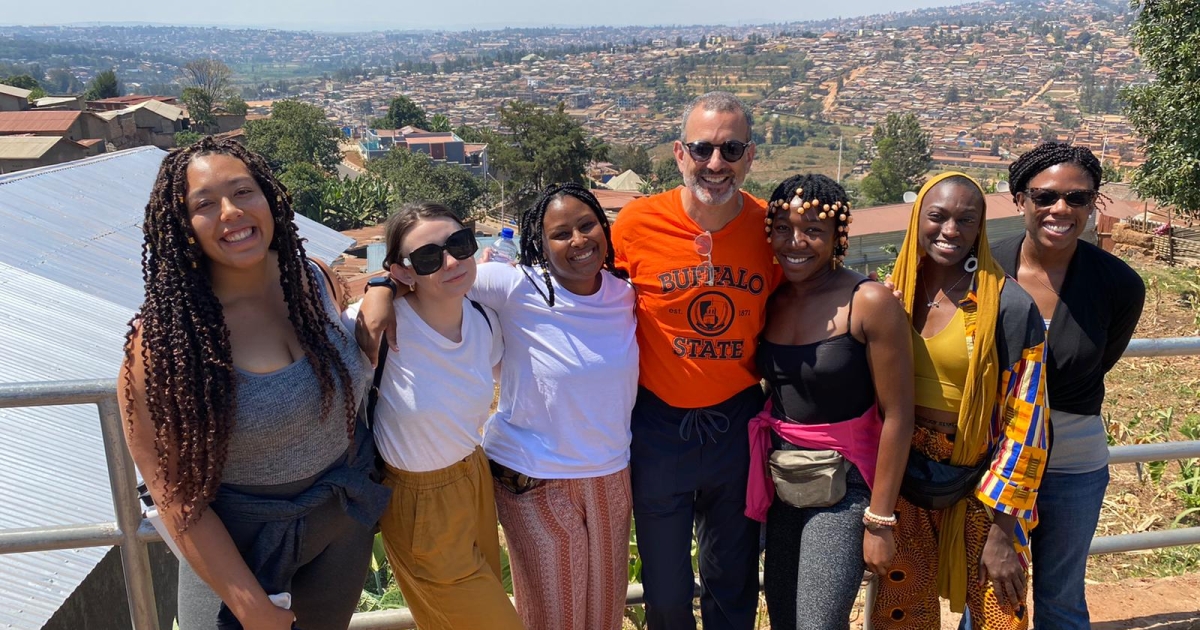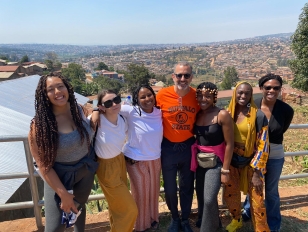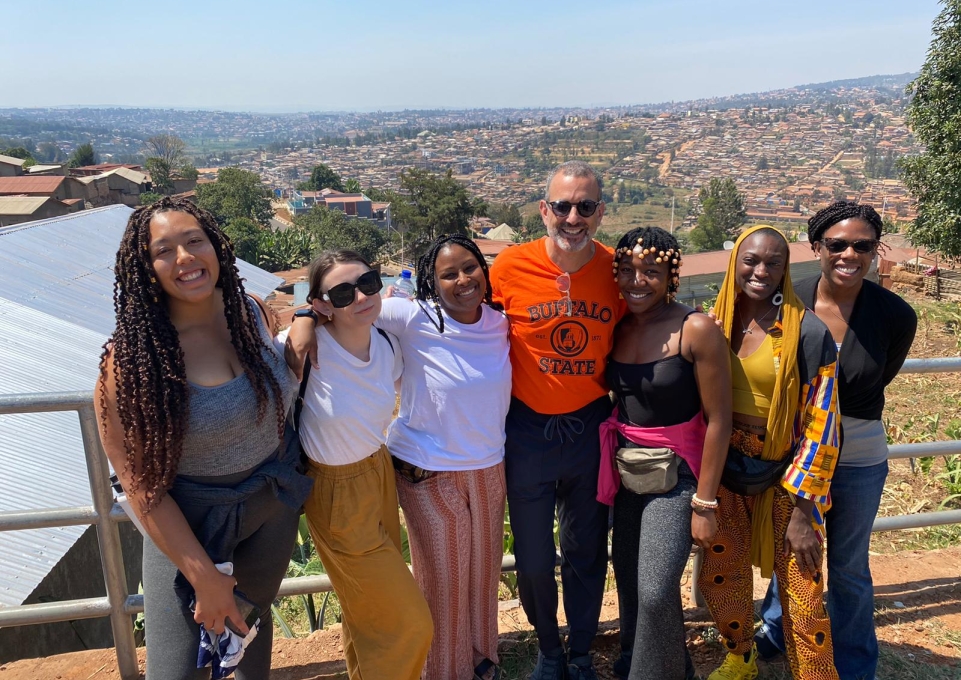
In 1993, if you’d asked Drew Kahn, SUNY Distinguished Service Professor and founding director of Buffalo State University’s Anne Frank Project (AFP), to find Rwanda on a map, he admits he “would have needed time.”
But in the 31 years since, Kahn has not only learned exactly where Rwanda is, but he has also cultivated a relationship with the country by bringing more than 150 Buffalo State students there for study-abroad through the Anne Frank Project, a program designed to build community, manage conflict, and explore identity by sharing stories stifled by oppression. In April, his work earned him an invitation to speak at an international United Nations conference commemorating the 1994 Genocide Against the Tutsi in Rwanda.
Here’s how this unique connection came to be.
1993: Kahn comes to Buffalo State
Kahn was hired as an assistant professor of theater in 1993. He taught acting, voice, and movement and directed productions. He played a key role in developing the university’s robust theater program, but he noticed that even with such active student involvement, something was missing.
“It was always curious to me: How come our campus has so much Black and Brown representation, but we don’t see that level in the theater?” he said. “Because we weren’t telling their stories.”

2006: Buffalo State produces The Diary of Anne Frank—as never seen before
Kahn suggested that the Theater Department present The Diary of Anne Frank, a stage adaptation of the diary Frank wrote while hiding with her family during Nazi occupation of the Netherlands. But Kahn did not want to mount a traditional production; he wanted students to connect to the story’s truth and emotional reality. With no shortage of genocides that had killed Black and Brown people, Kahn felt representing one of these genocides alongside Frank’s story was critical to both student and audience experience.
During his extensive research, Kahn kept coming back to the 1994 Genocide Against the Tutsi in Rwanda, during which extremist members of the Hutu ethnic majority murdered as many as a million Tutsi and moderate Hutu people. He came across Immaculée Ilibagiza’s book Left to Tell, in which the author conveys how—after watching her family’s execution—she hid with four other women in the home of a Hutu pastor.
“They hid in a bathroom and slid a bookcase over the door,” Kahn said. “She was a Rwandan Anne Frank.”
In the production—which did not alter a single word of text—Anne and Anana, a young Tutsi girl hiding from Hutu extremists, shared Anne’s monologues.
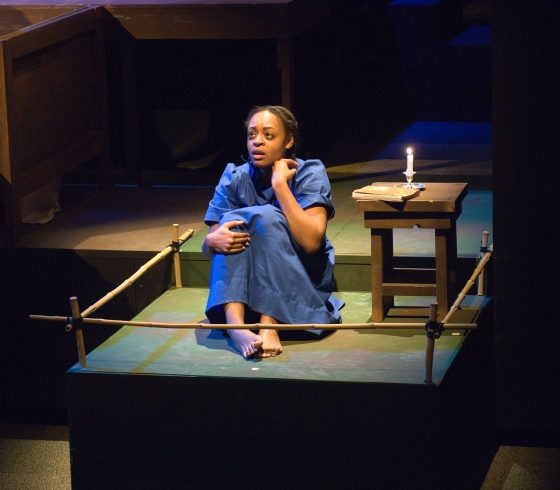
“I was terrified—in a great way—the whole time,” Kahn said. “I didn’t want to dilute Anne’s story, but I also didn’t want to ignore all the other Anne Franks around the world.”
On opening night, former Buffalo State president Muriel A. Howard remarked, “This production is Buffalo State.” Subsequent support from Buffalo State’s administration and SUNY gave rise to AFP because, even as Kahn developed the theater program—and served as department chair from 2008 to 2011—Rwanda kept tapping him on the shoulder.
“I learned more about their genocide response and reconciliation process; I couldn’t believe it was based on forgiveness, community, and love,” Kahn said. “I thought, ‘If the stories I’m reading are even close to the truth, American students need to see this.’”
2009: AFP hosts first Social Justice Festival
In response to Howard’s desire to replicate the vibe of the 2006 production, Kahn gathered a group of campus leaders to produce a one-time conference to celebrate the universal impact of Anne Frank, tell the stories of lesser-known “Anne Franks,” and engage students in kinesthetic (movement-based) learning. Each session was one-third theory and two-thirds practice.
The conference evolved into the annual Social Justice Festival, a two-day exploration of issues like shared humanity, social responsibility, inclusion, community engagement, mental health, systemic racism, roots of genocide, and personal healing. The festival is part of students’ coursework and connects them to international experts, artists, and leaders who facilitate interactive sessions. (In 2010, Ilibagiza was the featured presenter.) Each year, students who have traveled to Rwanda share stories with the audience.
2010: Kahn visits Rwanda for the first time
Kahn received a grant to present at the International Conference on Diversity in Organizations, Communities & Nations in Amsterdam. There, he met Carl Wilkens, former head of the Adventist Development and Relief Agency International in Rwanda and the only American who chose to remain in the country after the 1994 Genocide Against the Tutsi in Rwanda began. In his book, I’m Not Leaving, Wilkens chronicles how his choice saved many Rwandan lives.
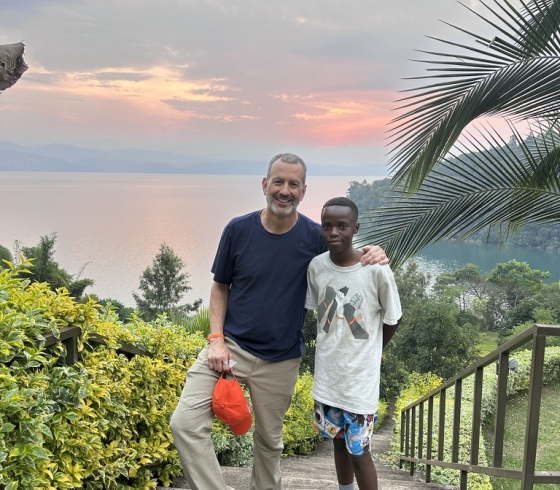
Kahn in Rwanda in 2023.
In 2010, Kahn traveled with Wilkens to Rwanda, expecting Rwandans to—rightfully—hold a grudge toward Americans, given the United States’ neglect of Rwanda.
“I had this idea that people were going to see I was American and throw rocks at me,” Kahn said. “The opposite happened. They hugged me and they loved me like a brother. The default emotion in Rwanda is joy.” Kahn added that traveling with Wilkens was “like going to a rock concert with Mick Jagger.”
People recognized Wilkens on the street, and Kahn said being with Wilkens allowed him to experience Rwanda’s culture on a deeper level. Throughout the trip, Kahn had one overwhelming thought: “We need to bring students here.”
Two years later, he did.
2012: First Buffalo State student delegation travels to Rwanda
On his first trip, Kahn met Hope Azeda, a theater artist and director of a performing arts school. “She was training college-age Rwandans to act, sing, and dance, but for social justice,” Kahn said. “The only thing I had confirmed is that we were going to work with her.”
The idea was for the two groups of students to build a play that Buffalo State would produce in its upcoming season. During these first two trips, the idea of story-based learning—a curricular platform designed to simultaneously teach academic lessons and address socioemotional needs—emerged.
“Stories provide access to humanity and order to chaos,” Kahn said. “This learning allows for critical conversations.”
In between rehearsals, Kahn, Wilkens—who accompanied the delegation for the first two years—and Rwandan students took Buffalo State students to schools, genocide memorials, refugee camps, “wherever we could open our students’ minds and hearts to the culture of Rwanda,” Kahn said.
“It confirmed that this was a meaningful educational platform,” Kahn said. “We’re not going there to save anybody; it’s quite the opposite. We’re going there to learn, connect, and immerse students in the positive potential of humanity. This guarantees a transformative experience supported by dignified, equal relationships. This was and remains an intentional commitment to bypass Western myths about Africa.”
The first year, the delegation gave a cow to a woman who’d lost her whole family in 1994. In Rwanda, cows are a symbol of wealth and provide practical value through milk and manure. The gift was met with ceremony, blessing, song, and dance. When Kahn returned with students the following summer, the same woman ran out of her home crying and shouting, “Thank god the mzungu [wanderer] came back!”
“‘We said we were coming back,’” Kahn told her. “She said, ‘Everyone says they will. Nobody does.’”
“We’re not going there to save anybody; it’s quite the opposite. We’re going there to learn, connect, and immerse students in the positive potential of humanity.”
2013: AFP links up with GEI and mayor’s office
At a conference held by the Association of International Educators, Kahn spoke of his Rwanda trips, which prompted an introduction to Michael Grosspietsch, founder of the Global Engagement Institute (GEI), which provides students and professionals with transformative education and engagement programs in Africa and Asia. In 2013, GEI was working to further develop programs in five countries—including Rwanda, where Grosspietsch himself had lived for seven years.
GEI became AFP’s “tour manager,” assisting with framework, accommodations, and scheduling. Grosspietsch even connected Kahn to the Rwandan minister of education. Around the same time, Buffalo Mayor Byron Brown’s office contacted Kahn to tell him that Muhanga, Rwanda, was one of Buffalo’s international sister cities. Kahn and students began transporting gifts between the two cities’ mayors’ offices, which, Kahn said, “solidified that relationship.”
2014–2015: AFP connects with Mama Arlene and Urukundo Learning Center
“Mama” Arlene Brown, a former nurse from Pennsylvania, moved to Rwanda in 2004 after serving as a relief worker in refugee camps following the genocide. In 2006, she created a home for vulnerable children in Muhanga and in 2010 established the Urukundo Learning Center, a school for children of low- and no-income families.
GEI manager Francoise Uzamukunda suggested that Kahn meet Brown. “She wants her teachers to teach better,” he said.
After Buffalo State students performed for Brown and her students, Brown presented Kahn with a group of 20 teachers.
“Teach them how you do that,” she said. “Teach them how to use stories.”
2016: Kahn formally develops curriculum for story-based learning
Meanwhile, requests for story-based learning curricula started coming from Buffalo-area teachers who’d experienced AFP’s work once a year when Kahn brought groups into schools. For Kahn, it was a call to action, and he responded with a two-day training session. On day one, teachers learn the history of story-based learning and how to “build a village”; on day two, they apply the methods to content areas.
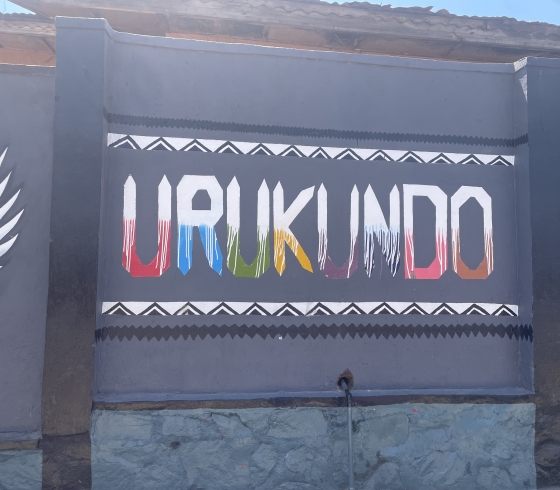
Kahn contacted the mayor of Muhanga to offer the training to Rwandan teachers. “I finally had something of substance to give back,” he said.
At the end of the training, Kahn distributed handouts—much of this information is replicated in his 2022 book, Story Building: A Practical Guide for Bringing the Power of Stories into Classrooms and Communities—but he knew paper was not enough. To make this stick, AFP would have to maintain relationships with the trained teachers—and it has.
In addition to Rwanda, AFP has strong relationships with the Buffalo Public Schools’ Office of Culturally and Linguistically Responsive Initiatives and Lafayette International Community High School of Buffalo and its principal, Buffalo State alumnus John Starkey, ’98.
2018: AFP begins working with its first Rwandan teacher cohort
Over the next few years, Kahn and his students trained more than 600 teachers from Urukundo and other centers. Today, AFP has trained nearly 1,000 teachers across 400 schools in Rwanda and the United States, influencing more than 90,000 students between the two countries.
October 2023: Donn Youngstrom Global Learning Lab opens on campus
The Donn Youngstrom Global Learning Lab—made possible by major gifts from the associate professor emeritus of theater and former chair of Buffalo State’s Theater Department—offers new technology that is, Kahn said, “like Zoom on steroids.” The lab allows Buffalo State students to interact live with students and educators from the Urukundo Learning Center. Two similar labs have been outfitted in East Africa.
“This lab allows us to sustain the work we are doing on a weekly basis,” Kahn said.
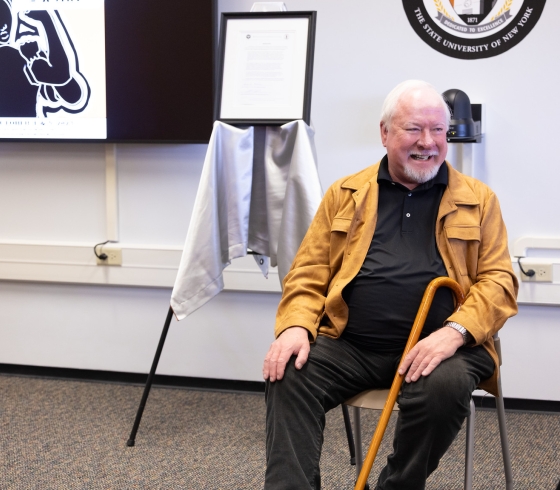
Donn Youngstrom enjoys the opening of the Global Learning Lab.
2024: Rwandan educators tell AFP, ‘We’re ready’
Through the Youngstrom Global Learning Lab, Rwandan educators communicated an important message: they were ready to be trainers themselves.
“They said, ‘We’re ready,’” Kahn said. “I said, ‘Ready for what?’ ‘To train our fellow Rwandan teachers on story-based learning in their classrooms when you and your students are not in Rwanda,’ they responded. ‘We can do it!’ It was music to my ears.”
April 2024: Kahn is invited to speak at national Kwibuka 30 events
Kwibuka, which means “remember” in Kinyarwanda, a national language of Rwanda, is an annual commemoration period that serves as a solemn remembrance of the 1994 Genocide Against the Tutsi in Rwanda and an opportunity to appeal to the world to prevent genocide whenever signs of risk begin to manifest.
In April 2024, Kahn was invited to attend and speak at two national Kwibuka 30 events:
- The United Nations’ International Conference on the Occasion of the 30th Commemoration of the 1994 Genocide Against the Tutsi in Rwanda in New York City
- The Embassy of Rwanda’s 30th Commemoration of the 1994 Genocide Against the Tutsi in Rwanda in Washington, D.C.
Kahn also gave remarks at Kwibuka events in Toronto, Dallas, and Buffalo.
“It is difficult to put into words how honored I was to be counted among the voices present at these events,” Kahn said. “These events validated the work our students, colleagues, and campus have invested in for years. I couldn’t be prouder to stand with our partners in Rwanda, especially as we hear genocide denials attempting to shift the narrative.”
Who can say where the story goes from here? Not Kahn, who said he never could have predicted the course his life would take.
“Rwanda kept grabbing me,” Kahn said. “I am living a lesson I share with students regularly: The universe is always speaking to you. Be brave enough to listen.”
Photos by Jesse Steffan-Colucci, Buffalo State photographer; Bruce Fox, former Buffalo State photographer; and courtesy of the Anne Frank Project.
